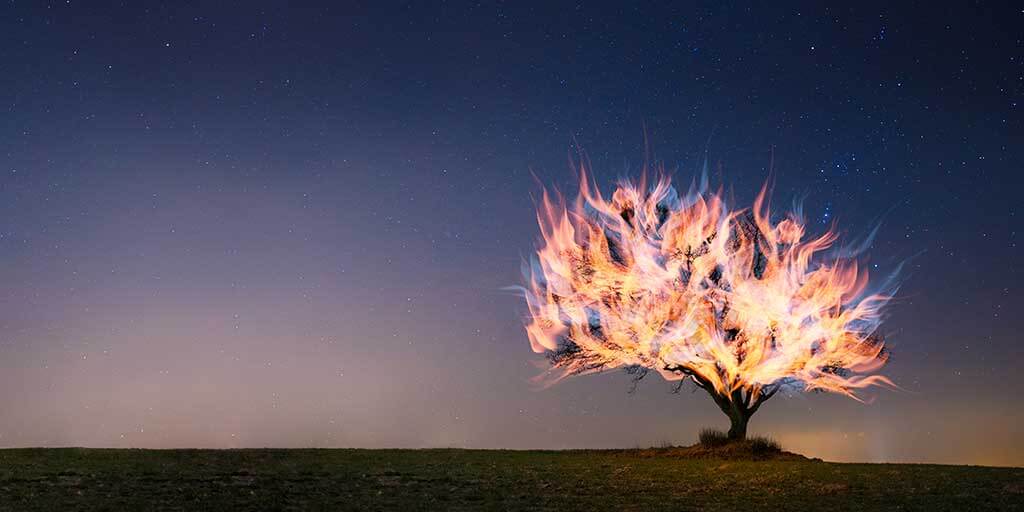The Aseity of God

The word aseity is probably not part of the average person’s vocabulary. And, although I have often been accused of having a larger than average vocabulary, it’s not a word I was familiar with, so, when I ran across it recently, I felt compelled to find out what it meant. Little did I know! Let’s look at the aseity of God.
It comes from the Latin “a se,” meaning “from himself.” Dictionaries explain aseity as:
- the quality or state of being self-derived or self-originated.
- the traditional divine attribute whereby God is said to exist of or from himself.
- existence originating from and having no source other than itself.
Basically, what it means is that God is. He simply is. He had no “cause,” and there is nothing and no one that He needs in order to be, or to continue to be. Hence the name He gives to Moses at the burning bush: “I AM” (Exodus 3:14).
Several Scriptures express this truth about God. For example (emphases added):
- Psalm 90:1-4 – Lord, you have been our dwelling place throughout the generations. Before the mountains were born or you brought forth the whole world, from everlasting to everlasting you are God. You turn people back to dust, saying, “Return to dust, you mortals.” A thousand years in your sight are like a day that has just gone by, or like a watch in the night.
- Psalm 102:25-27 – In the beginning you laid the foundations of the earth, and the heavens are the work of your hands. They will perish, but you remain; they will all wear out like a garment. Like clothing you will change them and they will be discarded. But you remain the same, and your years will never end.
- Isaiah 40:28-31 – Do you not know? Have you not heard? The Lord is the everlasting God, the Creator of the ends of the earth. He will not grow tired or weary, and his understanding no one can fathom. He gives strength to the weary and increases the power of the weak. Even youths grow tired and weary, and young men stumble and fall; but those who hope in the Lord will renew their strength. They will soar on wings like eagles; they will run and not grow weary, they will walk and not be faint.
- John 5:26 – For as the Father has life in himself, so he has granted the Son also to have life in himself.
- Revelation 4:10 – The twenty-four elders fall down before him who sits on the throne and worship him who lives for ever and ever.
Matthew Barrett explains,
“Uncaused, his existence is grounded in himself alone. That means not that he created himself or caused himself to be but that he alone, as Anslem says, ‘has of himself all that he has, while other things have nothing of themselves. And other things, having nothing of themselves, have their only reality from him.’”[1]
In his article, “The Eternality and Aseity of God,” John Frame declares, “God’s aseity means that he is sufficient to himself, independent of anything outside himself…. God is not in any way dependent on anything outside himself, but he has sufficient resources within himself for all that he is and does.”[2]
And, in his own inimitable style, Dr. William Lane Craig explains:
“The Bible is affirming that God is a self-existent being. Minimally that would mean that God doesn’t depend upon anything else for his existence. If everything else were magically to disappear, God would still be there. He exists independently of anything else….
“Aseity means that God exists by a necessity of his own nature. That is to say, it belongs to God’s very nature to exist. He doesn’t just happen to exist and happen to be independent of everything else. Rather, God exists by a necessity of his own nature. So if God’s nature is possible—if it is logically possible for God to exist—then he exists. He exists by a necessity of his own nature.”[3]
This is the God of whom the psalmist spoke when he wrote, “Before the mountains were born or You gave birth to the earth and the world, even from everlasting to everlasting, You are God” (Psalm 90:2)!
Go Deeper
- Christ Among Other gods – Book
- Christ Among Other gods 2 DVD’s and book – Package Offer
- Donate Audio Bibles
- Matthew Barrett, None Greater (Baker Publishing Group, Kindle Edition), p. 57, quoting Anselm, On the Fall of the Devil 1 (Major Works, p. 194). ↑
- John M. Frame, “The Eternality and Aseity of God,” thegospelcoalition.org. ↑
- William Lane Craig, “Doctrine of God: Divine Aseity,” reasonablefaith.org. ↑









Very insightful.